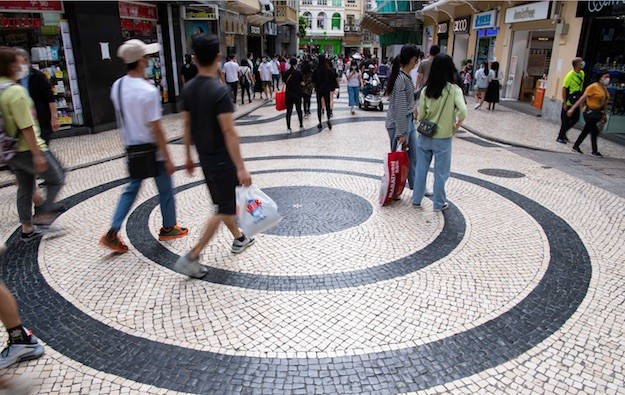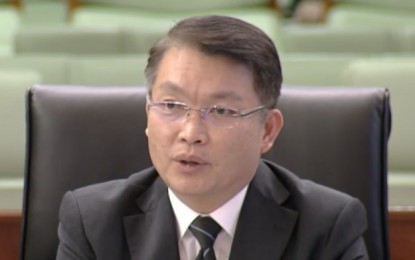Gait analysis emerging security tool: G2E Asia panel
Sep 17, 2020 Newsdesk Industry Talk, Latest News, Top of the deck

Technology that seeks to help identify a person from the way they walk, was one topic of discussion during a “Safety and Security” strand of the casino industry’s Global Gaming Expo (G2E) Asia Online Conference 2020, moderated by GGRAsia on Wednesday.
The session was a component of the “Roadmap to Growth” series organised by G2E Asia, about how the casino sector can manage a return to growth after the disruption of the Covid-19 pandemic.
The crisis has meant not only that many casinos in the Asia-Pacific region have been closed for lengthy periods this year, but also that when they have reopened, customers are typically required to wear face masks, creating challenges for respective casino managements in terms of being sure who is actually on their gaming floor.
G2E Asia Online Conference panellist Chris Chan, head of cyber security research at UDomain, a specialist in data and digital security, mentioned during Wednesday’s session, that “gait analysis”, also known as “gait recognition”, was an element in digital security. The technology has been around for some time, but is now being refined, according to reports.
The Associated Press news agency has reported that the authorities in China are already using gait recognition software – that uses people’s body shapes and how they walk – to identify them, even when their faces are hidden from cameras.
Wednesday’s session also looked at how casino operators – currently looking to save money, rather than spend a lot more – might be able to adapt or work with the technology they already have, in order to advance safety and security on their gaming floors.
Dave Dalleske, vice president sales for Asia Pacific at Synectics, which already supplies video surveillance equipment to casinos in the region, told the panel that the use of surveillance cameras for detailed analytic purposes – including being able to track an individual throughout a gaming property based on the colour of their clothing – was a developing area of interest for the industry.
Mr Dalleske also mentioned that supplements to surveillance-technology capability, so that it can monitor density of occupation on any given area of the floor, were also of interest. That applied particularly, he said, in the context where many casino jurisdictions are only permitting casinos to reopen at greatly-reduced occupancy levels on the gaming floor.
In the Philippines, Manila’s large-scale private-sector casino resorts have been instructed they will only be permitted to relaunch at 30 percent gaming capacity, as part of efforts to keep safe space between customers.
Martin Woodhouse, head of Asia Pacific, Middle East and Africa for Traka / ASSA ABLOY, which is involved in areas including management of secure access for entry keys and other casino-resort equipment, said that using conventional procedures, a single casino employee could spend on average 20 minutes per day, getting and returning such kit.
Via use of his firm’s browser-based management software – to oversee processes more efficiently – the time spent, and therefore cost incurred, from such activities, could be cut down significantly.
Also touched on during the conference session were efforts to develop facial recognition technology that can use data points based on the unmasked, upper portion of a person’s face. Demand for such technology stems from the now-widespread use of face masks in public places during the pandemic.
China’s SenseTime was one of the firms mentioned in that context. According to other media reports, SenseTime has also been offering security products that incorporate thermal-recognition cameras in surveillance equipment.
Related articles
-
 Konami Gaming, Xailient launch new...
Konami Gaming, Xailient launch new...Nov 02, 2023
-
 Synectics in deal for surveillance gear...
Synectics in deal for surveillance gear...May 04, 2023
More news
-
 Macau to get 36mln visitors in 2025:...
Macau to get 36mln visitors in 2025:...Nov 21, 2024
-
 EBITDA a focus in Macau market share...
EBITDA a focus in Macau market share...Nov 21, 2024
Latest News
Nov 21, 2024
Macau’s 2025 visitor tally could reach 36 million, or a circa 9-percent gain on this year’s projected 33 million. So said Lei Wai Nong (pictured in a file photo), the city’s Secretary for...Sign up to our FREE Newsletter
 (Click here for more)
(Click here for more)
Pick of the Day
”[Baccarat side bets in Macau] are becoming more popular amongst players, based on what we observed when we conducted our [monthly premium mass] table surveys”
George Choi and Timothy Chau
Analysts at Citigroup
Most Popular
 Gaming technology firm IGT reports hacking incident November 21, 2024
Gaming technology firm IGT reports hacking incident November 21, 2024  US$30bln 2025 GGR target achievable for Macau: CE November 19, 2024
US$30bln 2025 GGR target achievable for Macau: CE November 19, 2024  Marina Bay Sands projects 40pct EBITDA leap post extension November 20, 2024
Marina Bay Sands projects 40pct EBITDA leap post extension November 20, 2024  Macau big-event outdoor venue gets trial run Dec 28: CE November 20, 2024
Macau big-event outdoor venue gets trial run Dec 28: CE November 20, 2024  Future of gaming is the online format: Pagcor chairman November 20, 2024
Future of gaming is the online format: Pagcor chairman November 20, 2024









